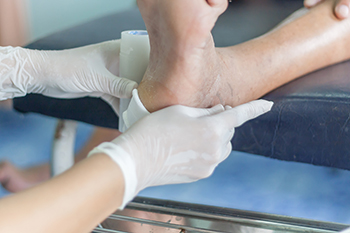
A puncture wound can be a small hole in the foot that can be caused by stepping on a sharp, pointed object. It often produces discomfort, and the foot can also become bruised and swollen. Additionally, some patients have difficulty moving the affected area, and it is beneficial to seek medical attention. An animal bite also may cause a puncture wound, and an X-ray may be taken that can determine the depth of the wound. It is important that the wound is properly cleaned, and this can begin with removing existing dirt and debris. This can be followed by applying medicine to the wound, which may help to prevent a bacterial infection. Symptoms may be managed by frequently elevating the foot and keeping it above heart level. This is often effective in reducing swelling and pain that may be present. If you have additional questions about how to perform proper wound care for the foot, it is suggested that you ask a podiatrist who can help you with useful information.
Wound care is an important part in dealing with diabetes. If you have diabetes and a foot wound or would like more information about wound care for diabetics, consult with Dr. Richard Silverstein from Union Foot Care. Our doctor will assess your condition and provide you with quality foot and ankle treatment.
What Is Wound Care?
Wound care is the practice of taking proper care of a wound. This can range from the smallest to the largest of wounds. While everyone can benefit from proper wound care, it is much more important for diabetics. Diabetics often suffer from poor blood circulation which causes wounds to heal much slower than they would in a non-diabetic.
What Is the Importance of Wound Care?
While it may not seem apparent with small ulcers on the foot, for diabetics, any size ulcer can become infected. Diabetics often also suffer from neuropathy, or nerve loss. This means they might not even feel when they have an ulcer on their foot. If the wound becomes severely infected, amputation may be necessary. Therefore, it is of the upmost importance to properly care for any and all foot wounds.
How to Care for Wounds
The best way to care for foot wounds is to prevent them. For diabetics, this means daily inspections of the feet for any signs of abnormalities or ulcers. It is also recommended to see a podiatrist several times a year for a foot inspection. If you do have an ulcer, run the wound under water to clear dirt from the wound; then apply antibiotic ointment to the wound and cover with a bandage. Bandages should be changed daily and keeping pressure off the wound is smart. It is advised to see a podiatrist, who can keep an eye on it.
If you have any questions, please feel free to contact our office located in Havre de Grace, MD . We offer the newest diagnostic and treatment technologies for all your foot care needs.
